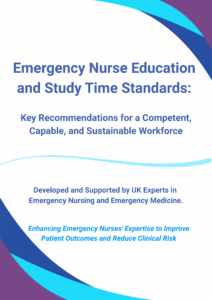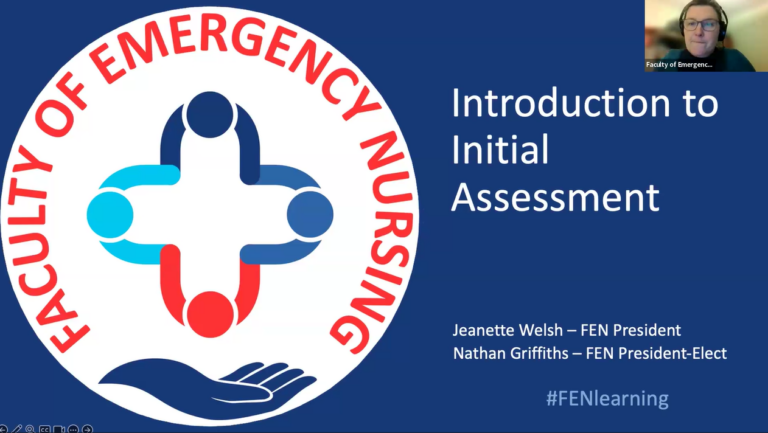The Faculty of Emergency Nursing
Providing Education to develop the knowledge, competence and capabilities of nurses working in Emergency Care settings
Emergency Nurse Education and Study Time Standards
 FEN is delighted to share this landmark document, which sets out clear recommendations to transform Emergency Nursing and care delivery across the UK.
FEN is delighted to share this landmark document, which sets out clear recommendations to transform Emergency Nursing and care delivery across the UK.
This new recommendation paper, developed and supported by UK experts in Emergency Nursing and Emergency Medicine from NHS Trusts, Health Boards, and Professional Organisations, presents a timely opportunity to shape the future of Emergency Nursing across the UK.
It outlines a strategic, sustainable development plan centred on protected education time, clearly defined role-specific pathways, and equitable access to Clinical Nurse Educators — with practical proposals to reduce variation, improve retention, and enhance the quality and safety of care.
The paper aligns with national policy priorities and has been submitted to Government health ministers, shadow ministers, Chief Nursing Officers, and national education bodies.
🔷 Download the Full Document here
Key Recommendations Include:
✅ A Minimum Annual Education Time Entitlement (in addition to mandatory/statutory learning):
75 hours for ongoing development and preparation
225 hours for those undertaking formal progression
330 hours (SPA) + 75 hours study leave for those in or training for autonomous roles. Note: Additional time may be required for university programmes or those using the apprentice levy.
✅ Nationally recognised, role-specific development pathways aligned to enhanced, advanced, and expert levels of practice
✅ Guaranteed access to dedicated Emergency Nurse Clinical Educators in every Emergency Department, with recommended staffing ratios
✅ Investment in the training, development, and time allocation for Clinical Educators, recognising their essential role in sustaining workforce capability
✅ Integration of education standards into workforce planning and job descriptions, ensuring consistency and accountability across the system
These proposals aim to ensure Emergency Nurses are equipped, supported, and retained—so they can continue to deliver safe, effective care in one of the NHS’s most demanding clinical settings.
CPD Webinar Subscription
£52/year (£1/week)
Take control of your career and unlock new opportunities in Emergency Nursing with unlimited access to a growing library of over 200+ expert-led webinars.
This essential education bundle is designed to support your clinical excellence, career development, and preparation for the standards outlined in FEN’s new Emergency Nurse Education and Study Time Recommendations.
What’s Included (Webinar Subscription):
- 📘 Key clinical topics – Stay up to date with emergency nursing essentials
- 🧭 Leadership and management – Build confidence and capability in leading care
- 🎓 Expert-level content – For nurses at advanced and senior levels
- 🩺 Initial Assessment Project – Learn to assess and prioritise undifferentiated patients effectively
Professional Benefits:
- ✅ CPD Certification – Certificates awarded through short evaluations, ideal for portfolios, appraisals, and NMC revalidation
- ✅ Free CPDme Access – Includes online portfolio and education programme (worth £24.99/year)
- ✅ Quality-assured assessment documentation – Supports your professional growth and career progression
- ✅ Eligible for NHS England CPD funding (via your organisation – England only)
- ✅ Aligned with Emergency Nurse Education Standards
**Relaunching soon**
Regulated and accredited qualifications in emergency nursing to enhance your emergency nursing career.
- Individual units available
- Combined programme to achieve Level 6* Qualification in Emergency Nursing
- Recognised across the UK and Ireland**
- Vocational (Work-based) learning programme
**Level 6 (UK and NI), Level 8 (ROI), Level 10 (Scotland)
📂Quality assured assessment documentation to support your progress through the qualification process.
Catch Up
All previous recordings available on catch-up
Qualifications
EQF Level 6 Diploma in
Emergency Nursing
Example Webinar Topics
Please note that some webinars are only available to FEN Members
UPCOMING LIVE WEBINARS
Not a member but fancy watching a great webinar? Purchase individual videos now
Choose the perfect plan for you
The cost of access to our CPD Webinars is £52 per year per person.
If you wish to purchase our Corporate CPD Webinar Subscription; please see our Corporate CPD Webinar Subscription (Education Bundle) details
Frequently asked questions
No, the programme can be used flexibly, FEN will support people to gain a qualification, equally they will support members just wishing to complete some CPD.
You can find more information and complete an order form for payment on invoice here: https://fen.uk.com/corporate-education-bundle. Having a purchase order number at the time of order will make the process more efficient.
If you wish to pay by a different method (ie. corporate credit card) use the ‘contact us’ form here: https://fen.uk.com/contact-us
No, you can watch the webinars in any order, unless they are specifically linked. (this will be clear in the title)
On completion of an evaluation following attendance at a webinar or watching on catch-up, you will receive a certification of attendance.
No, but the unit/qualifications have to be presented to the Internal Quality Assurance Board electronically for them to be accredited, so some form of electronic portfolio is essential.
Both universities and awarding bodies use the CQFW (Credit and Qualifications Framework for Wales) and Quality Assurance Agency for Higher Education (QAA) crediting system. So, attaining 120 credits at level 6 indicates the same degree of difficulty and number of study hours as what would be attained in the university’s final year of an honour’s degree programme. You will notice in job descriptions it often stipulates degree or equivalent – this is that equivalent. This can be clearly seen in the fan diagram found in the CQFW learner Guide[1].
We would like to build on this, so if your question has not been answered please contact us.




